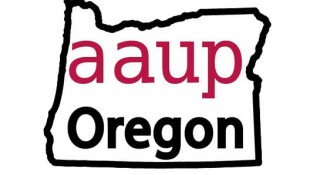PSU-AAUP: We have a contract!

 by Leanne Serbulo, VP Collective Bargaining PSU AAUP
by Leanne Serbulo, VP Collective Bargaining PSU AAUP
After spending ten long months at the bargaining table, we finally reached a tentative agreement. On March 15th, at the end of a marathon, twelve-hour session, PSU AAUP and the administration signed-off on a four-year contract. In a high turnout election, our members overwhelmingly voted to ratify the agreement.
The new contract makes significant progress on some of the longstanding issues faculty and academic professionals have faced at Portland State University. In our previous contract negotiations, we settled just days before we were due to go out on strike. While that agreement made some strong gains, there were a number of issues that were left unresolved. In this round of negotiations, we used an interest-based bargaining process and had a facilitator present at every bargaining session. The IBB process provided a framework for us to be able to tackle some of the entrenched employment issues at PSU, like the lack of job security, insufficient support for professional development and academic professional workloads. While the IBB process was useful, what made the real difference in this round of negotiations was the fact that we were bargaining from a position of strength. After having narrowly averted a strike in the previous round of negotiations, the administration could no longer just dismiss the needs of our members.
Some of the highlights of our new agreement include:
- Sick Leave Bank: Allows members to pool unused sick leave and withdraw 30 days of paid leave if they have exhausted their own leave and face a catastrophic illness, need to care for a loved one or need parental leave.
- Continuous Appointments for Non-Tenure Track Faculty: NTTF are now eligible to become permanent faculty members with meaningful job security protections. Current NTTF who have reached seniority and have satisfactory evaluations can have their contracts automatically convert to a continuous appointment. Grant-funded, research NTTF are also eligible for continuous appointments if their unit has a track record of being able to raise sufficient funds for their positions.
- Summer Session: Summer salaries are now guaranteed in the contract. We had no language protecting summer pay, and as a result, our faculty experienced pay cuts during the past three summers.
- Academic Professional Class and Comp study: Academic professionals are a large and diverse employee category that includes advisors, program administrators, research administrators and curriculum/instructional support specialists. There is little room for advancement in these positions, and many APs remain stuck at the bottom of the pay scale. A class and comp study will design new AP job categories that include promotional pathways and recognition for years of service, experience and expertise.
- Workload protections: Academic professionals cannot be assigned an “unreasonable and excessive workload.” A new process was established to deal with workload issues, which ends in arbitration.
- Individual Professional Development Accounts: Tenure-related faculty will receive $1000, Non-Tenure Track Faculty $600 and Academic Professionals $500 annually to spend on professional development activities. These funds can accumulate and roll over for up to four years. The individual accounts replace a woefully underfunded lottery-based travel pool.
- Bridge Funding Pool: A $70,000 pilot program to cover temporary gaps in funding that would otherwise result in researcher lay-offs or FTE reduction.
- Sabbatical Pay Increases: Starting in AY 2017/18, faculty taking a two term sabbatical will be paid 80% of their salary and those with on three term sabbatical will earn 75% of salary.
- COLA increases guaranteed: We will receive COLA increases each year pegged to the Consumer Price Index rate for the Portland metro area. COLAs can be no less than 1.5% and no more than 3.5%.
- Equity Pools: Starting in 2017, there will be annual salary pools (0.75%, 0.8% and 0.9%) that will begin to address compression/inversion and market equity issues.
- Economic Re-opener: If unanticipated changes occur that affect the budgetary outlook for PSU (such as an increase in the state allocation or a larger than expected rise in PERS rates), either side can request reopener bargaining on economic issues.
- Four year agreement: The contract expires in November, 2019.
This contract was a result of countless hours spent at and away from the bargaining table. As always, it was a collective effort. A big thank you to the bargaining team, our Action Team, Unit Reps and all PSU AAUP members who remained active and engaged during this long round of negotiations. You made this contract possible. A special thanks to Margaret and the AAUP Oregon and AFT Collective Bargaining representatives from around the state. Your support, feedback and generosity during our monthly calls helped inspire some of the gains we made.

